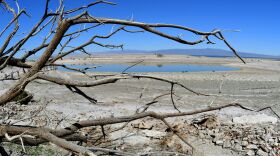
John Nielsen
John Nielsen covers environmental issues for NPR. His reports air regularly on NPR's award-winning news magazines, All Things Considered, Morning Edition and Weekend Edition. He also prepares documentaries for the NPR/National Geographic Radio Expeditions series, which is heard regularly on Morning Edition. Nielsen also occasionally serves as the substitute host for several NPR News programs.
During his years with NPR, Nielsen has reported on a wide range of topics, including the environmental records of the last three U.S. presidents; changing world population trends; repeated attempts to limit suburban sprawl; socially divisive water shortages in the Middle East; allegations of "toxic racism" in the United States; rhinoceros relocation efforts in the lowland forests of Nepal; and attempts to track and cope with the West Nile virus, toxic algal blooms, environmental problems related to economic globalization, and the causes of global climate change.
Before joining NPR in 1990, Nielsen was a Knight Fellow in the Science Journalism program at the Massachusetts Institute of Technology. Prior to that, he worked for the Los Angeles Times, The Orange County Register, and the Salisbury (North Carolina) Evening Post.
Nielsen's Condor: To the Brink and Back--The Life and Times of One Giant Bird (HarperCollins) was published in 2006 and is out in paperback in March 2007. The book focuses on the long-running fight to save the California condor, a giant rare vulture that used to be common near his childhood home, the tiny town of Piru, California.
Nielsen's freelance work has been published in a variety of newspapers and magazines. He has lectured at the University of Utah, Princeton University, and Yale University. In 2005 he was awarded the Science Journalism Award for Excellence in Radio Reporting by the American Association fo the Advnacement of Science.
He is a graduate of Stanford University, where he studied Shakespeare. Nielsen has three children and lives in Washington, DC.
-
Critics say the state's mitigation plan falls far short of what's needed to protect this former tourist mecca from the impact of the coming water transfer.
-
The White House is weighing what could become the biggest conservation program in U.S. history. The initiative would block vast stretches of U.S. territorial waters from fishing and oil exploration, while giving President Bush a historic "blue legacy."
-
The Bush administration announces on Wednesday that the polar bear will be protected as a threatened species because of the decline in Arctic sea ice from global warming. It's the first time that the Endangered Species Act has been used to protect a species threatened by the impact of climate change.
-
Satellite mapping has uncovered in Darfur a buried lakebed the size of Massachusetts. Scientists think its water may have seeped into a reservoir underneath it. If that's the case, it could help ease fighting in one of the driest places on Earth.
-
A new report from the National Academy of Sciences says the honey bees that pollinate billions of dollars worth of farm crops are in decline. That could spell trouble for the farm economy.
-
As the world gets hotter, plants and animals have been trying to adjust by changing when they bloom, migrate, molt, and breed. For some species, these adjustments come off nicely and for others they don't. One European bird's chicks now hatch at a time of year when there's not much around for Mom to feed them.
-
The U.S. government announces that it is expanding efforts to test wild and domestic birds for the deadly Asian bird-flu virus. Experts say it is a matter of when, not if, the virus arrives in the United States. We visit two Maryland chicken farms to see how U.S. farmers are preparing for the threat.
-
Circumstantial evidence is mounting that wild birds are carrying the H5N1 virus along major migratory pathways. The virus has been linked to ducks moving through Europe's Danube delta. Though no solid proof exists so far, concern is growing that these ducks could play a role in creating a flu pandemic.
-
The Bush administration wants to change a rule that requires the rebuilding of depleted fish stocks within a decade. The 10-year rule helped curb an over-fishing crisis when it took effect in 1996. Supporters say the rule is out of date and ineffective; environmental groups strongly oppose the move.
-
A report by the National Research Council says there is still room for improvement at the National Zoo, but concludes the zoo has made strides toward providing better conditions for its animals. Congress asked for this independent review in 2002 when two endangered red pandas died after eating rat poison buried in their enclosure.


